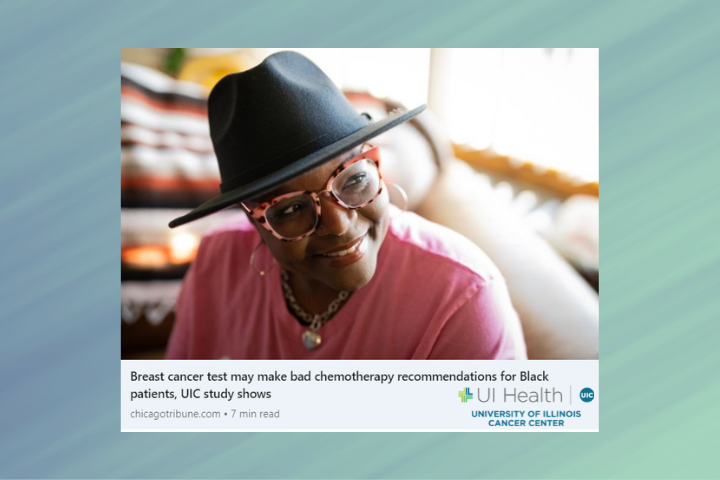
The Chicago Tribune featured important population-based research by University of Illinois Cancer Center members and others. The study raises the possibility that the Oncotype 21-gene breast recurrence score (RS), the most commonly ordered multigene breast cancer biomarker in the United States, might underestimate the benefit of chemotherapy for non-Hispanic Black women, which could perpetuate racial disparities in breast cancer survival of estrogen receptor (ER)-positive, HER2-negative tumors by misguiding treatment recommendations.
Kent Hoskins, MD, Oncology Service Line Medical Director at UI Heath and part of the Cancer Center’s leadership team, is the study’s senior author.
“We know there is underrepresentation of Black women in trials that were used to develop this test; we know that Black women are more likely to have biologically aggressive tumors and that there are differences in tumor biology,” Hoskins told the Tribune. “That concerns us that maybe this test is not fully and accurately reflecting prognoses for Black women.”
Research Details
The study, “Reduction in Breast Cancer Death With Adjuvant Chemotherapy Among US Women According to Race, Ethnicity, and the 21-Gene Recurrence Score,” was published early this year in the official Journal of the National Comprehensive Cancer Network (JNCCN).
The predictive biomarker 21-gene RS was developed to inform which patients are or aren’t likely to benefit from adjuvant chemotherapy. The NCCN Clinical Practice Guidelines in Oncology for Breast Cancer base its recommendation on the RS for ER-positive tumors with no armpit lymph node metastases.
Other Cancer Center study authors are VK Gadi, MD, PhD, Cancer Center Deputy Director; Oana C. Danciu, MD, Cancer Center Associate Director for Clinical Research; and Garth H. Rauscher, PhD. Other authors are Hsiao-Ching Huang, MPH, UIC College of Pharmacy; Jennifer Weiss, MD, and Yael Simons, MD, both past fellows in the UIC Hematology and Oncology Fellowship Program; and Gregory S. Calip, PharmD, MPH, PhD, University of Southern California, Los Angeles. Before moving to USC, Calip was a Cancer Center member and Assistant Professor at the University of Illinois Chicago School of Pharmacy.
